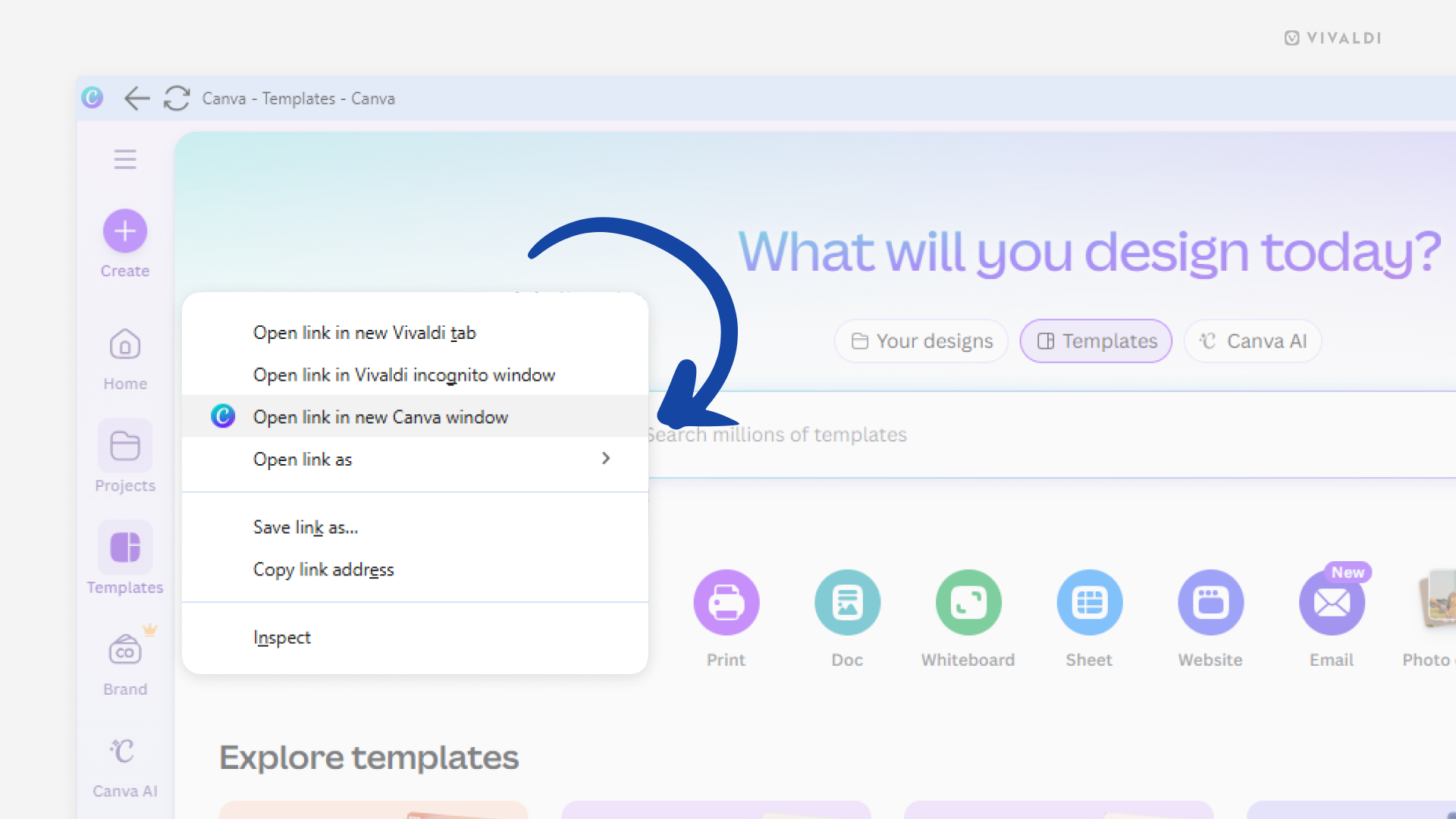Vivaldi Tips
A huge collection of Vivaldi browser tips, tricks and hacks.
Tip #795
febrero 26, 2026
Automatically fill login fields in Vivaldi on Android with the password manager of your choice.
You can save your passwords in Vivaldi on Android for quick autofill assistance during login, but you can also use third-party password managers, such as Bitwarden, Proton Pass, and others. On Android, depending on which option you prefer you need to select the correct setting.
To use a third-party password manager:
- Go to Settings > Autofill services.
- Enable «Autofill using another service»
- Restart the browser.
From the Autofill services settings page, you can also find a shortcut to Android settings where you can choose your preferred autofill app.
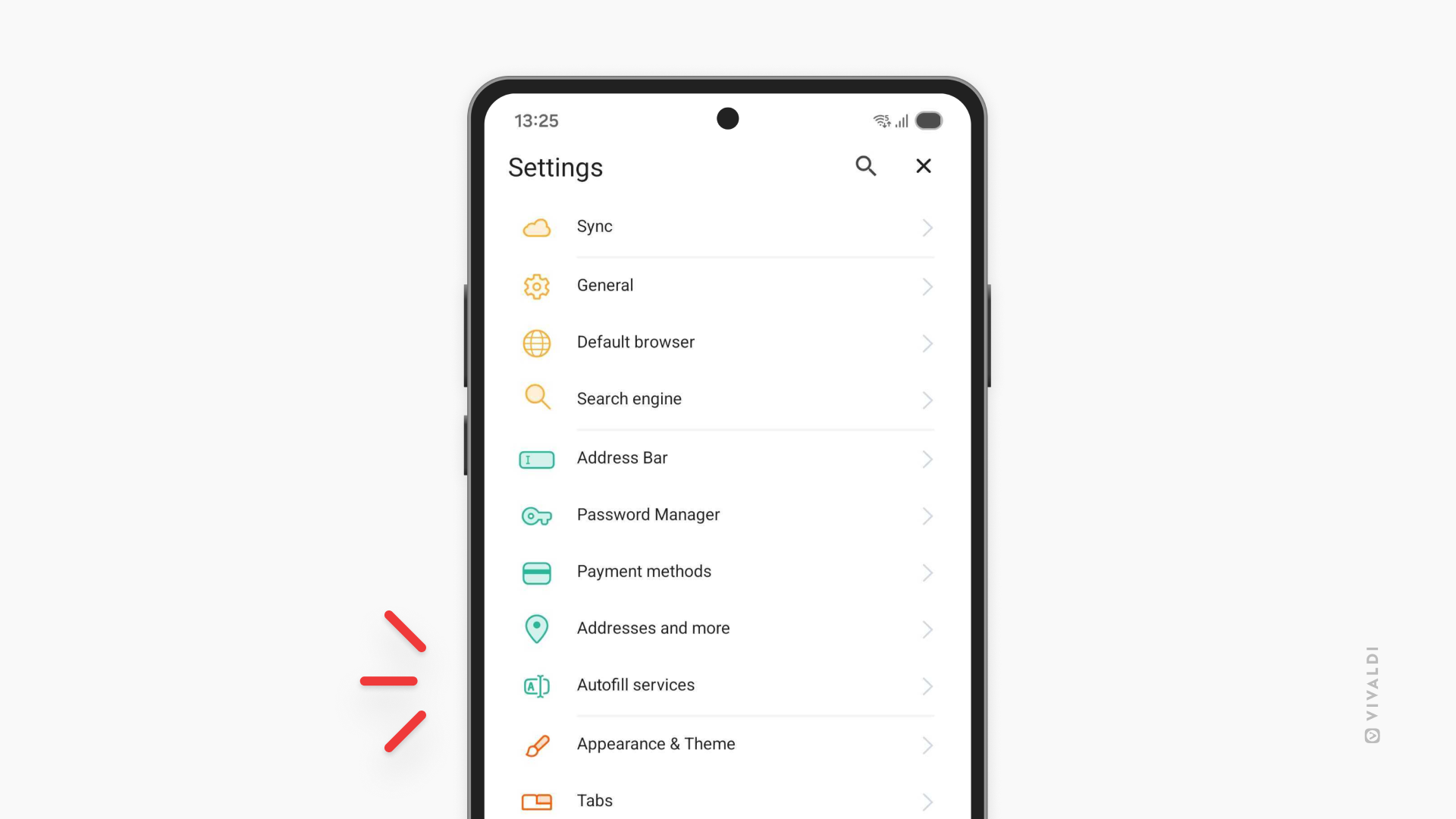
Tip #794
febrero 19, 2026
Discover new accounts to follow on Vivaldi Social.
Without any algorithms to fill your Vivaldi Social home feed, it’s up to you to curate it with interesting accounts. There are different ways to approach this. For example, by checking accounts that use topic hashtags that you’re interested in or paying attention to accounts boosted by people you already follow. But there’s also a page on Vivaldi Social listing accounts that you might want to check out.
To view your follow recommendations, go to the Trending > People page.
There you can take a look at the suggested accounts and either give them a follow or remove them from the list.
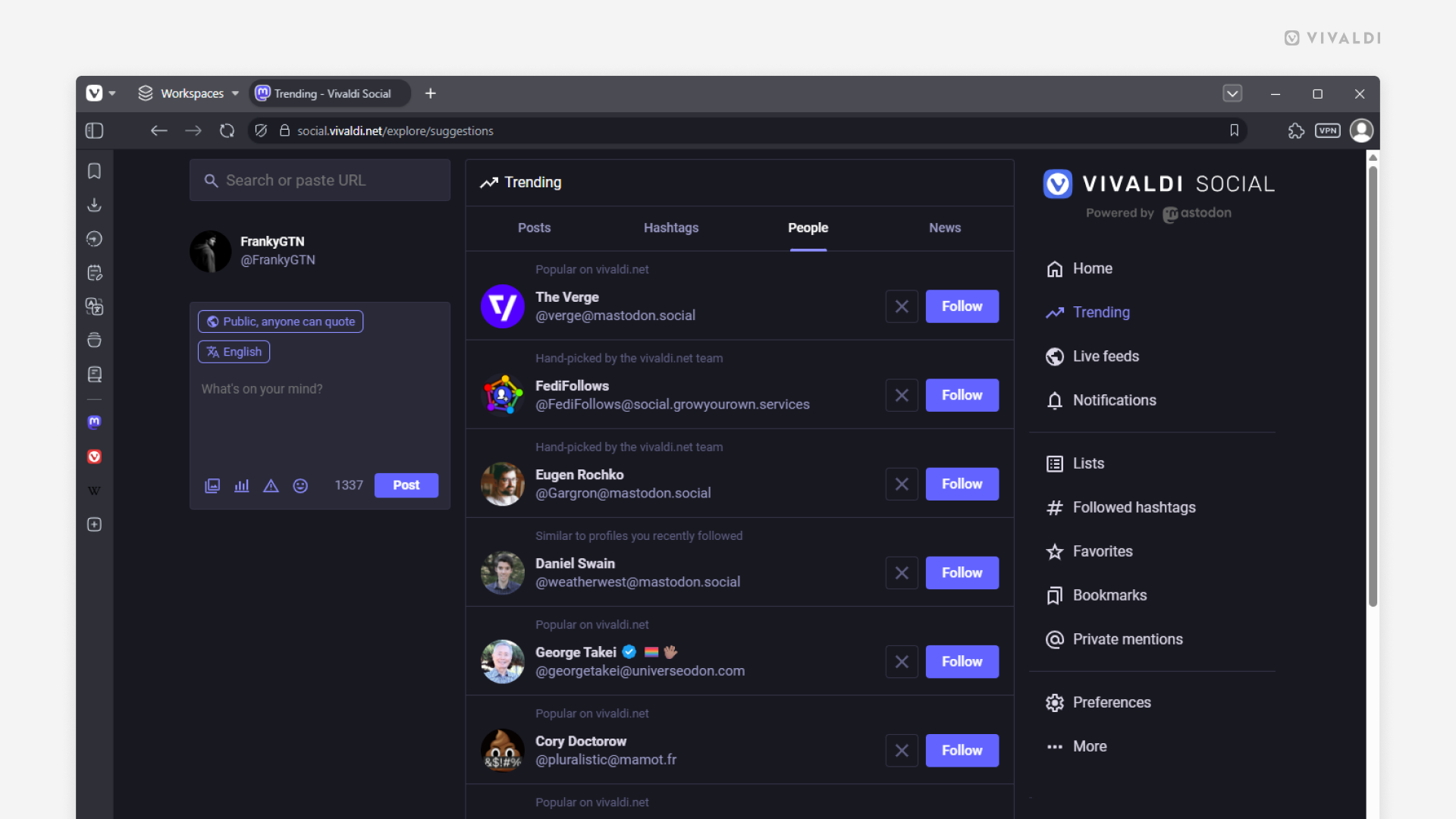
Tip #793
febrero 17, 2026
Create a split-screen view by tiling tabs with drag and drop.
Instead of constantly switching back and forth between tabs, you can tile tabs to create a split-screen view. Tab Tiling lets you compare, reference, monitor, and think in parallel. There are a few different ways to tile tabs, but drag and drop is probably the easiest one.
To tile tabs:
- Have one of the tabs you want to tile open in the active tab.
- Find the other tab from the Tab Bar and start dragging it towards the page.
- Move the mouse to the side where you want the dragged tab to be in the tiled view – left, right, top or bottom.
- Release the mouse button to create a tiled view.
You can add more tabs to the tiled view with the same method.
Tip #792
febrero 12, 2026
Open the Tab Switcher in Vivaldi on iOS with a swipe on the Address Bar.
Whenever you want to get a good overview of all your standard, private, synced, etc. tabs, the Tab Switcher is the place to go.
To enable Address Bar swipe gesture:
- Go to Settings > Address Bar > Address Field Options.
- Toggle on «Enable Address Bar Swipe Gesture».
Once the setting is enabled, all you need to do is swipe from the Address Bar towards the page to open the Tab Switcher. In other words, swipe down when the Address Bar is at the top and swipe up when the Address Bar is at the bottom of the screen.
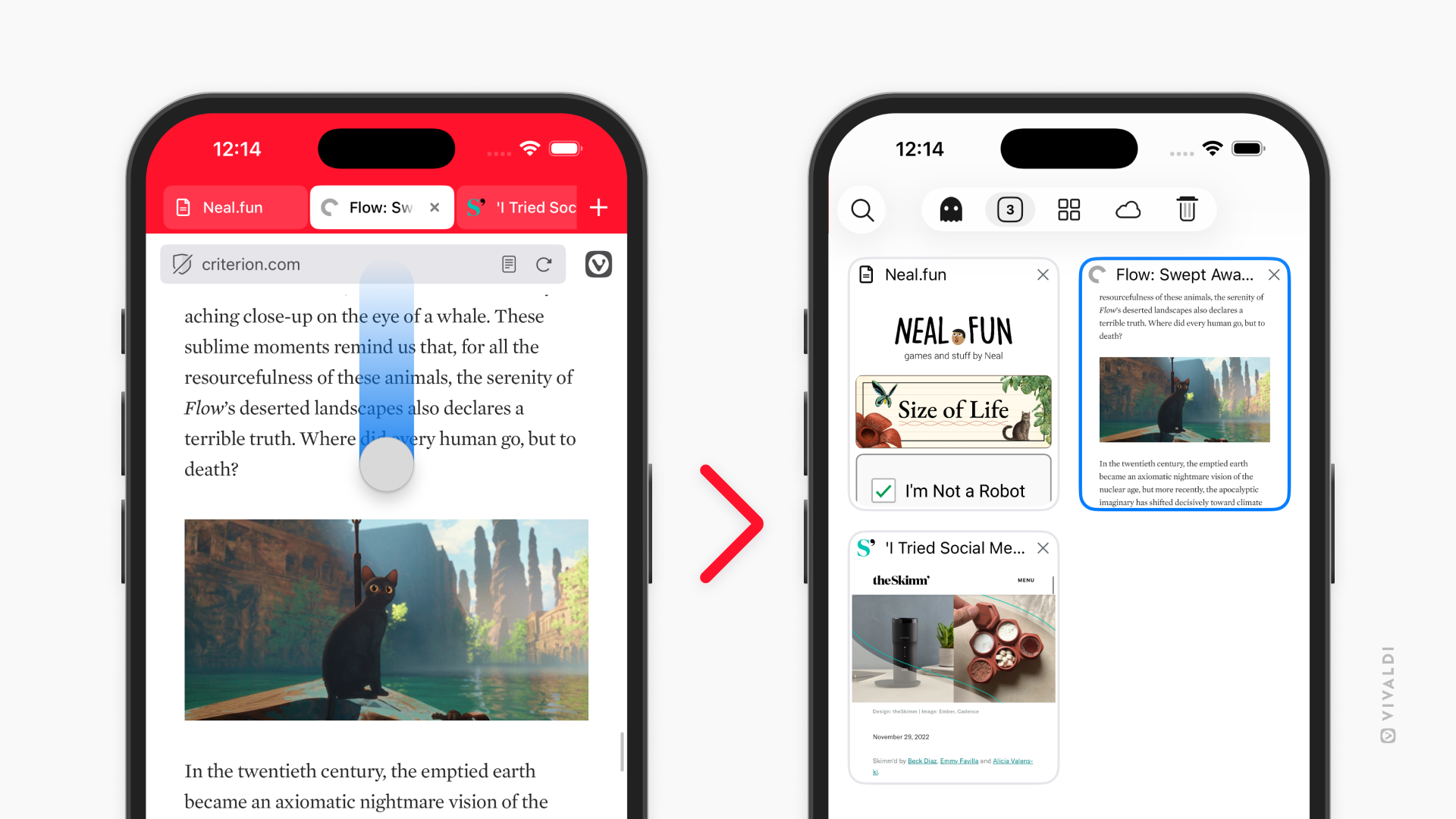
Tip #791
febrero 10, 2026
Get a new Start Page look every day with Daily Images.
When you open a new tab in Vivaldi, you likely see the Start Page with your favorite Speed Dials and Widgets. To give the Start Page some character, set a unique background for it. You can go for a solid color, select an image from the defaults, use your own image, or get a new automatically updated photo every day from Unsplash.
To enable Daily Images, either:
- Open Quick Settings from the top right corner of the Start Page and select «Daily Image» in the Background Image section.
- Go to Settings > Themes > Editor > Background and select «Daily Image».
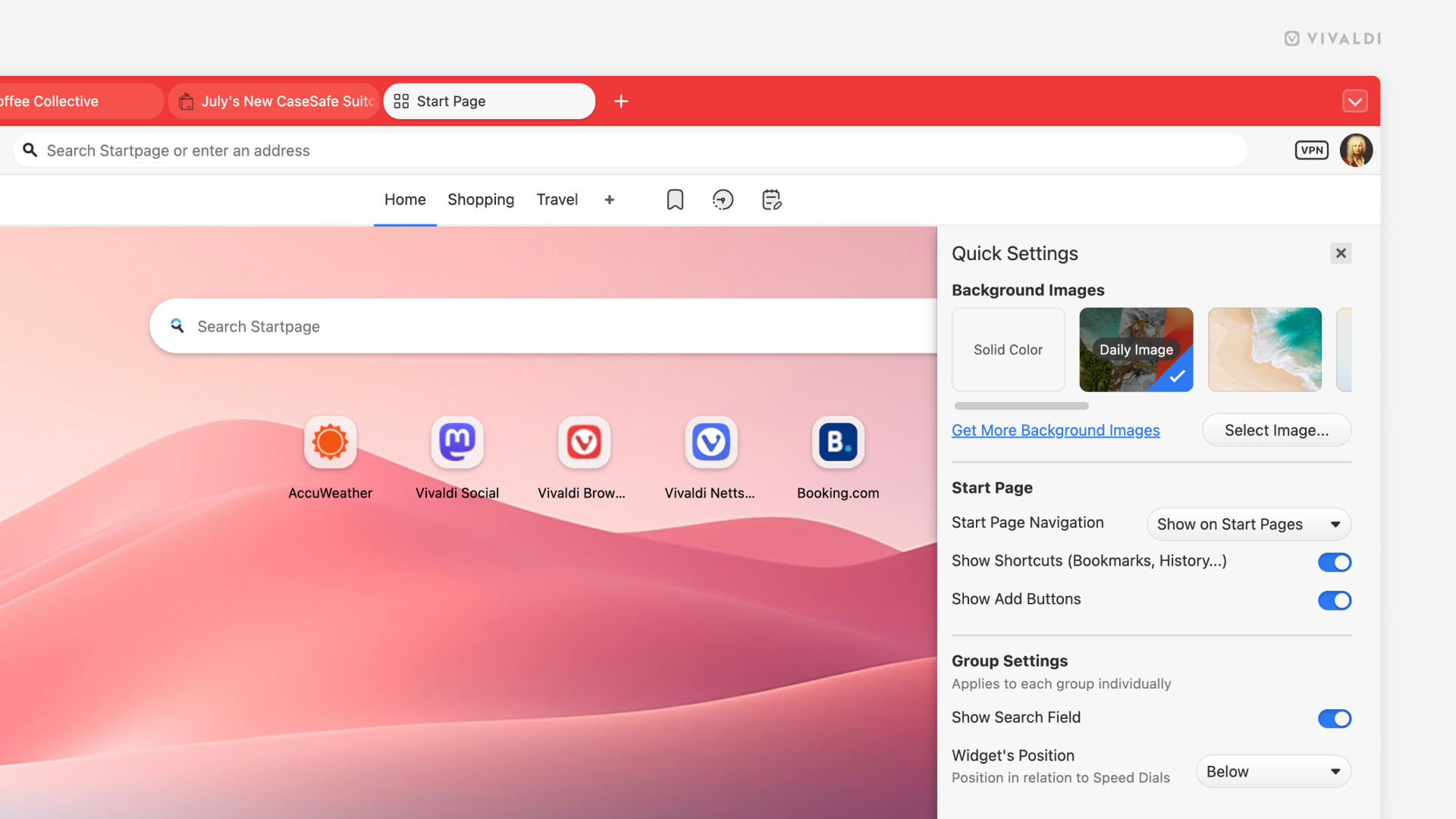
Tip #790
febrero 5, 2026
Keep the most important tabs in Vivaldi on Android within easy reach by pinning them.
Tabs can accumulate fast on mobile devices. To make sure you can always access your frequently used tabs quickly, pin them in place.
To pin a tab on the Tab Bar:
- Long-press on the tab on the Tab Bar.
- Select «Pin Tab».
To pin a Tab in the Tab Switcher:
- Open the Tab Switcher.
- Long-press on the tab’s thumbnail.
- Select “Pin Tab”.
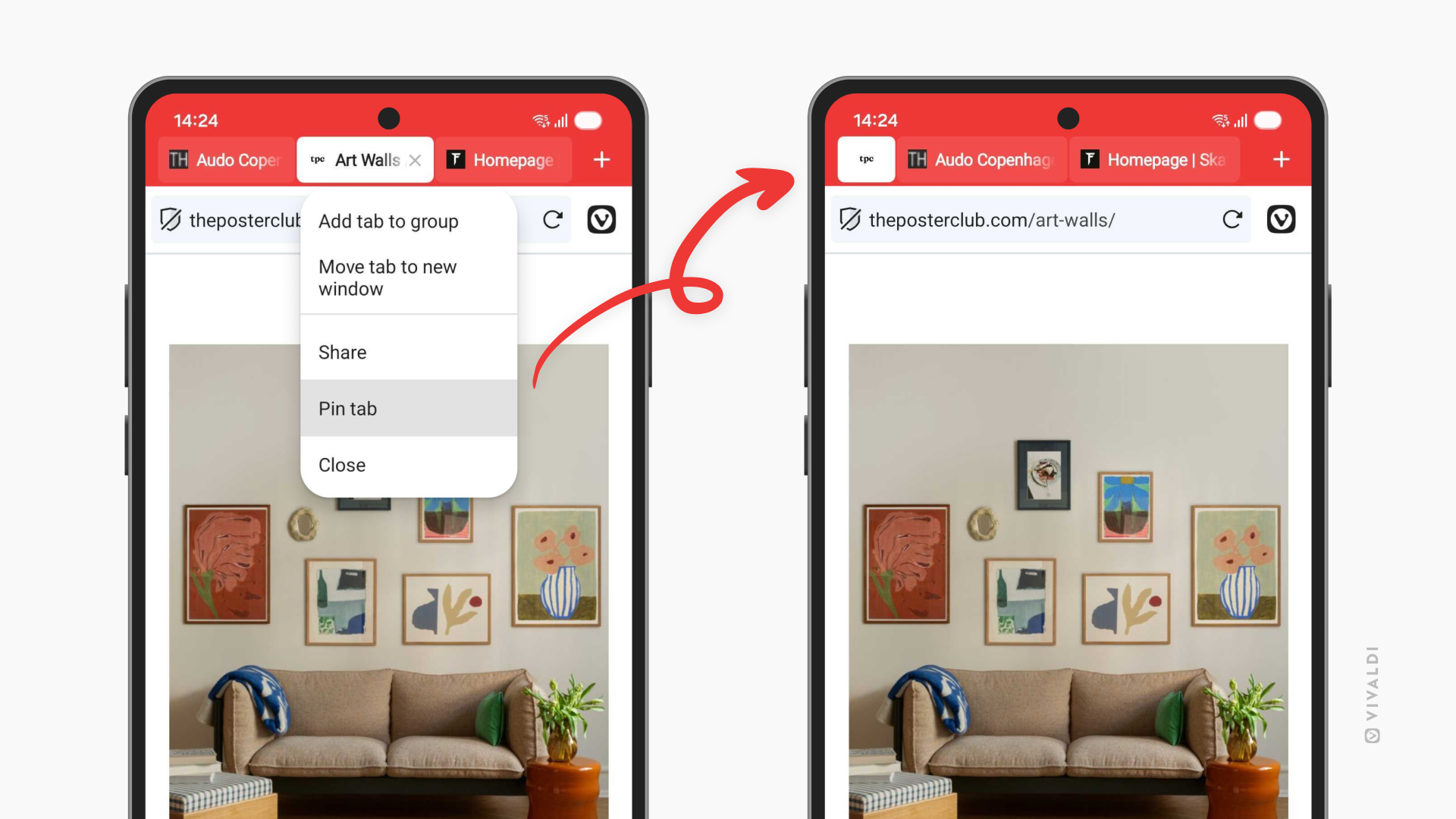
Tip #789
febrero 3, 2026
Tile a tab opened from a link with its parent tab in one move.
In a tiled view, you’ll have two or more tabs displayed simultaneously, allowing you to conveniently browse and compare content on multiple web pages at once. There are many ways to tile tabs, but if you’re about to open a link from a web page that you will be tiling with the active tab, follow the instructions below to cut this multi-step action down to just one step.
To create a tiled view from a link:
- Right-click on a link on the web page.
- Select Open Link In > Open Link as Tiled Tab.
When you do the same on an already tiled tab, the new tab will be added to the tiled view.
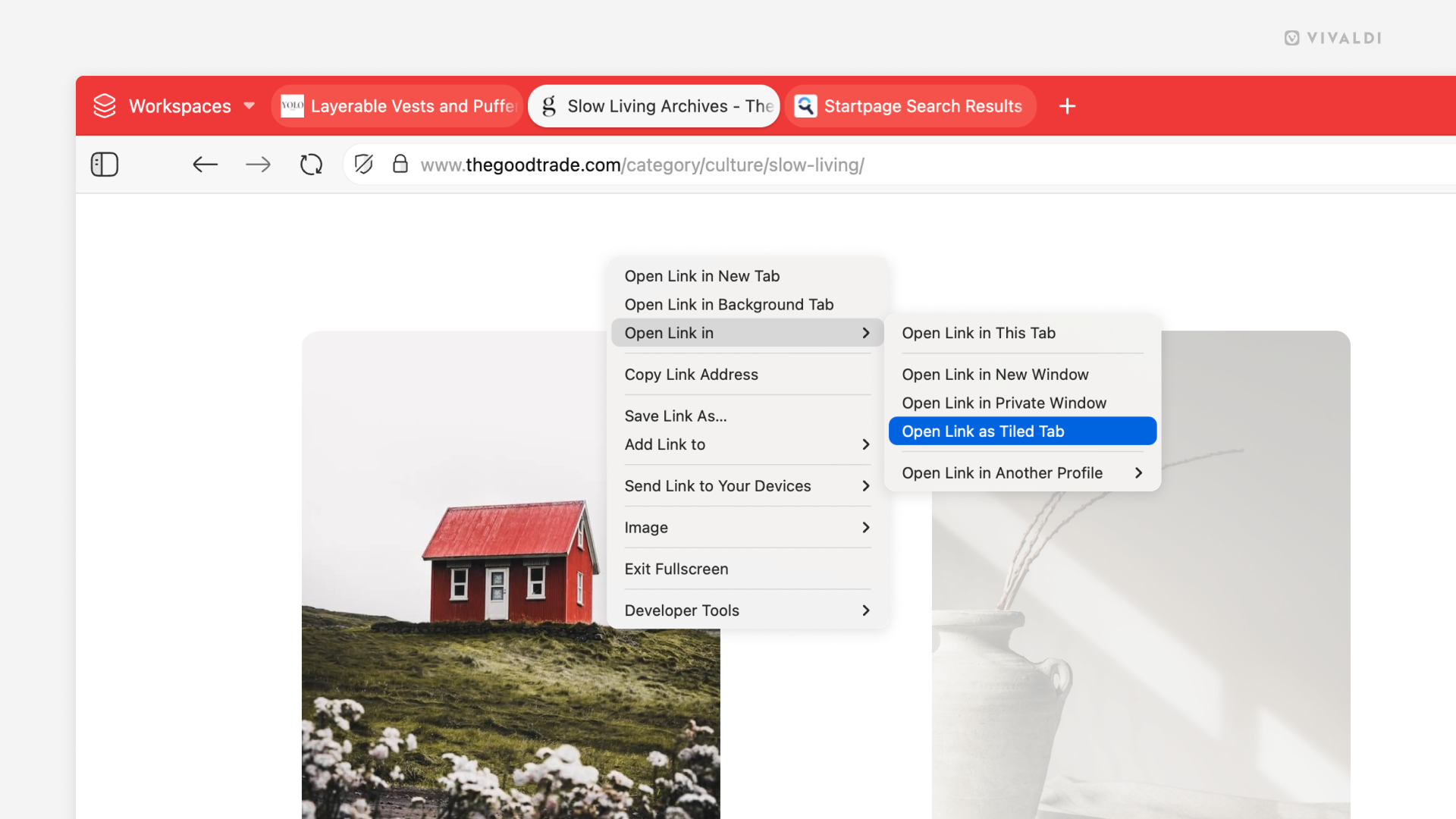
Tip #787
enero 29, 2026
Restrict pinned tabs to the current site.
Pinning tabs allows you to keep your most-used tabs open and available in the same location at all times. But that doesn’t prevent you from straying from the originally pinned site. To make sure your pinned tabs stays on the site, you can restrict browsing in that tab to the pinned domain.
To keep the Pinned Tabs locked to the same domain:
- Right-click on the pinned tab.
- Select Restrict Pinned Tab to Current Site.
When enabled, all links from the same domain will open in the pinned tab and all links from other domains will open in new regular tabs.
Tip #786
enero 27, 2026
Place the Tabs close button where it’s convenient for you.
Vivaldi is famous for allowing you to configure the smallest of details. One such detail is the location of the tabs close button on the Tab Bar.
To choose the close button’s side:
- Go to Settings > Tabs > Tab Display > Tab Options.
- From «Display Close Button’s» subsettings, toggle «On Left Side» on or off, as needed.
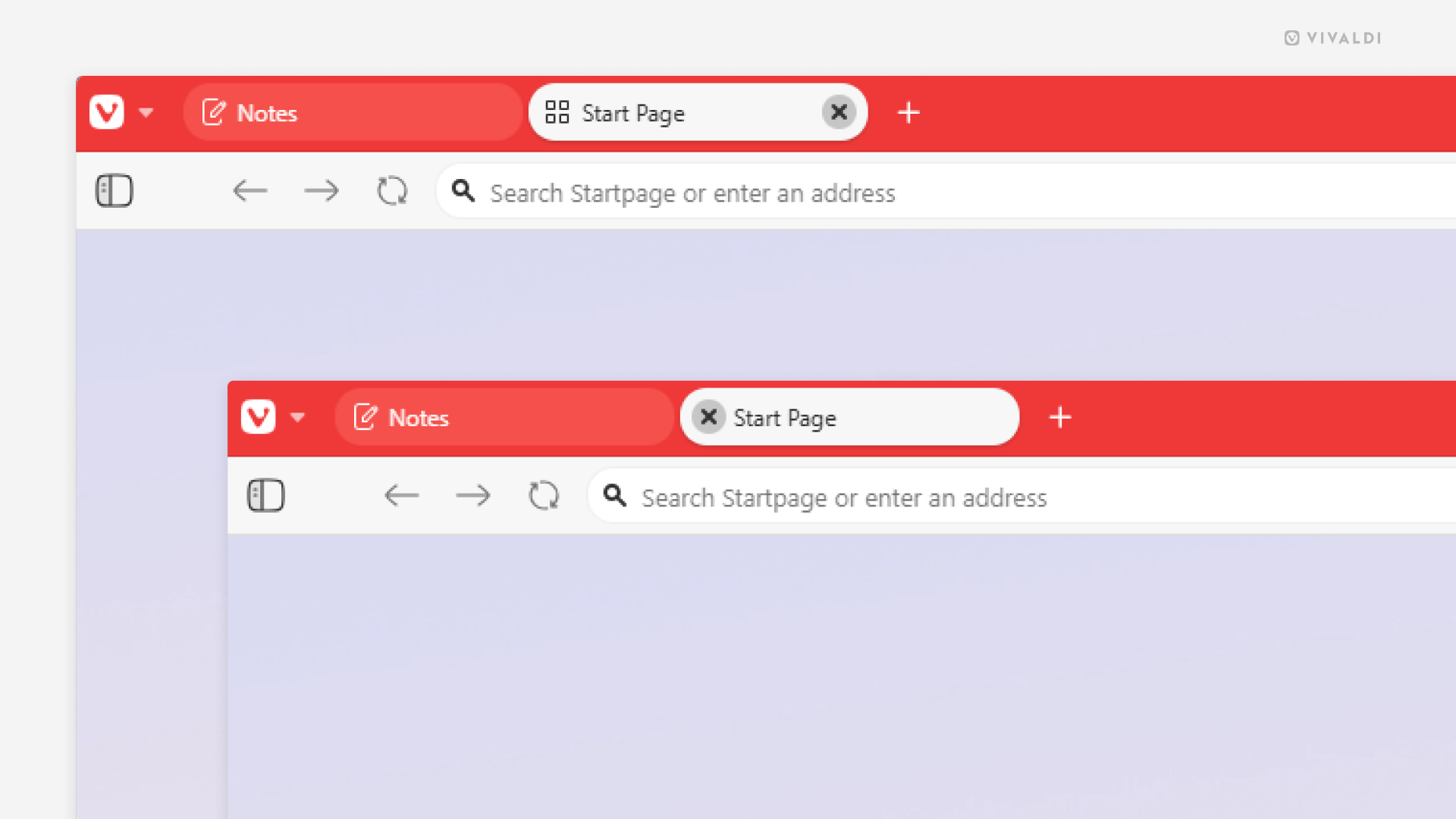
Tip #785
enero 22, 2026
Reuse or delete Workspaces that no longer serve a purpose.
When you’re done with a project that you created a Workspace for in Vivaldi it’s time to reuse it for a new project, or if there are currently no new projects, just delete it.
To reuse a Workspace:
- Open the Workspaces menu.
- Right-click on the one you want update.
- Select «Edit Workspace» from the context menu.
- Give it a new name and select a new icon.
- Click «Done».
- Close all tabs in the Workspace.
To delete a Workspace:
- Open the Workspaces menu.
- Right-click on the Workspace you want update.
- Select «Delete Workspace».
Deleting a Workspace will also close all tabs in it. If you want to keep some tabs around, move the tabs first or reopen them from the Closed Tabs menu.
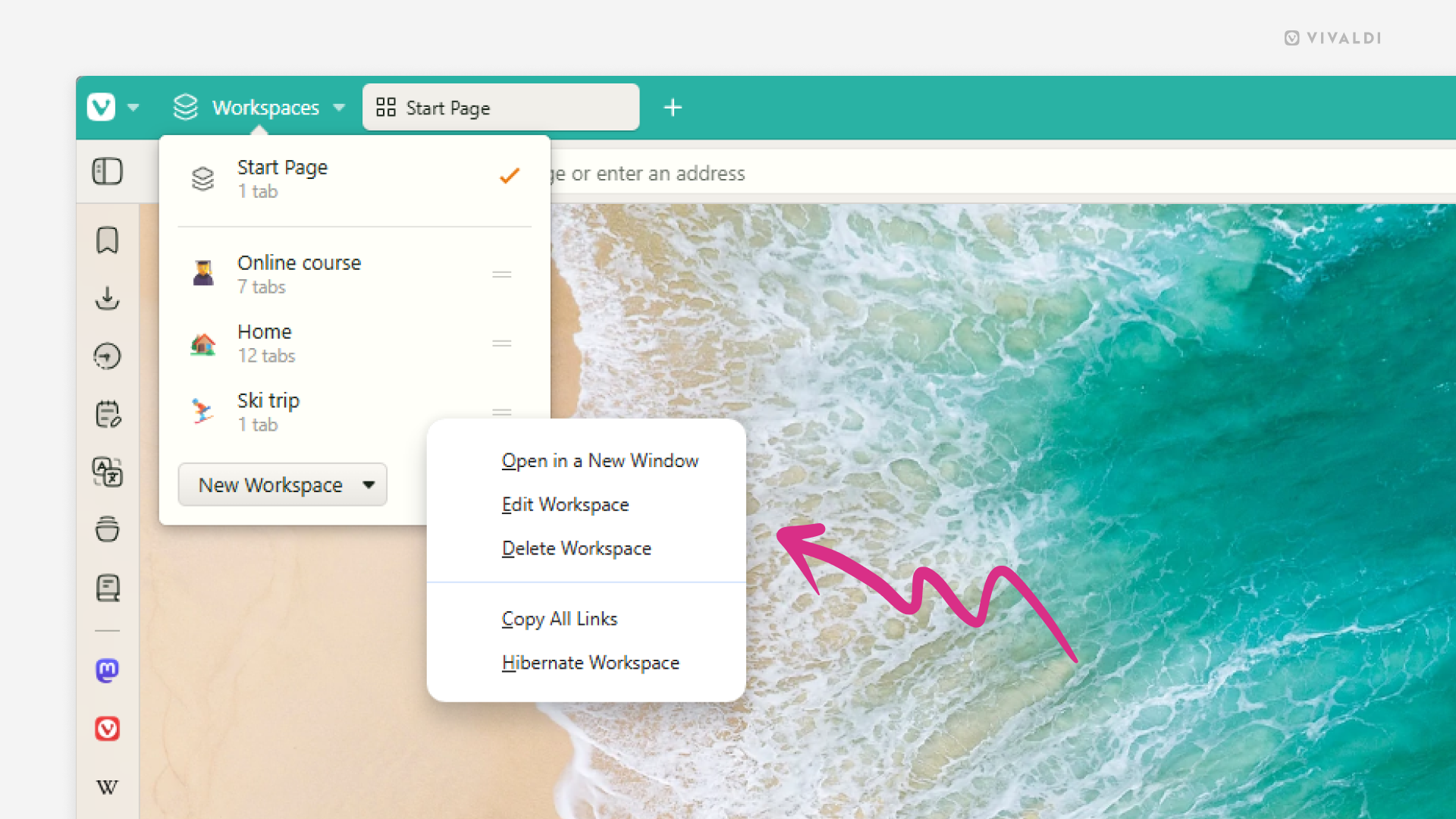
Tip #784
enero 20, 2026
Set up bookmark folders in Vivaldi on Android to efficiently manage your favorite sites.
Dividing your bookmarks in Vivaldi into logically structured folders makes accessing them faster and managing them easier. There are a few ways you can create new bookmark folders in Vivaldi on Android. Find the one that works best for you.
To create a new bookmark folder on the Start Page:
- Long-press on the «Add» button on the Start Page.
- Select «Folder».
- Give the new folder a name and select a parent folder (Location).
- Tap «Done».
To create a new Speed Dial Group (bookmark folder on the Start Page):
- Swipe past the last group on the Start Page.
- Tap on «Add New Group».
- Give the new folder a name.
To create a new folder by editing a bookmark:
- Find a bookmark you’d like to add to the new folder in the Bookmarks Panel or Start Page.
- Long-press on the bookmark and select «Edit» (pencil icon in the Bookmarks Panel).
- Tap on the current folder.
- Tap on «New Bookmark Folder».
- Give the new folder a name and select a parent folder (Location).
- Tap on «Done» in the top right corner 3 times.
To create a new folder when adding a new bookmark.
- Go to the page you want to bookmark.
- Add it as a new bookmark from the main menu.
- Tap on the banner that appears at the bottom of the page.
- Tap on the current folder.
- Tap on «New Bookmark Folder».
- Give the new folder a name and select a parent folder (Location).
- Tap on «Done» in the top right corner 3 times.

Tip #783
enero 15, 2026
Open multiple Progressive Web App windows to improve your workflow.
Progressive Web Apps (PWAs) are a great way to make a website feel like an independent app without actually needing to install a native app. Sometimes you may find yourself needing to view content from multiple PWA pages at once, though. You could open the other page in the main Vivaldi browser window, but you could also open it in a second PWA window.
To open a page from the PWA’s domain in another window:
- Right-click on the link.
- Select «Open link in new [PWA name] window».
